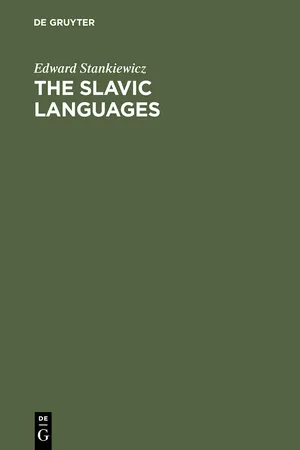
- 487 pages
- English
- PDF
- Available on iOS & Android
eBook - PDF
About this book
No detailed description available for "The Slavic Languages".
Tools to learn more effectively

Saving Books

Keyword Search

Annotating Text

Listen to it instead
Information
Edition
1Table of contents
- Preface
- Abbreviations of Journals
- Abbreviations of Languages and Dialects
- List of Symbols
- Towards a Phonemic Typology of the Slavic Languages
- The Historical Phonology of Common Slavic
- The Common Slavic Prosodic Pattern and its Evolution in Slovenian
- On Discretness and Continuity in Structural Dialectology
- The Phonemic Patterns of the Polish Dialects: A study in structural dialectology
- The Vocalic Systems of Modem Standard Slovenian
- The Dialect of Resia and the “Common Slovenian” Accentual Pattern
- Polish Mazurzenie and the Serbo-Croatian Palatals
- The Singular-Plural Opposition in the Slavic Languages
- The Grammatical Genders of the Slavic Languages
- The Fate of the Neuter in the Slovene Dialects
- The Collective and Counted Plurals of the Slavic Nouns
- The Interdependence of Paradigmatic and Derivational Patterns
- The Accentuation and Grammatical Categories of the -a Stems in South Slavic
- The South Slavic Infinitive and its Accentuation
- The Inflection of Serbo-Croatian Substantives and their Genitive Plural Endings
- Grammatical Neutralization in Slavic Expressive Forms
- The Appellative Forms (the Vocative and Imperative) of Bulgarian
- The Expressive Suffix -x- in Polish and in Other Slavic Languages
- Slavic Morphophonemics in its Typological and Diachronic Aspects
- The Asyllabic Verbal Stems in Slavic and Their Accentuation
- The Slavic Vocative and its Accentuation
- The Place and Function of Stress in Russian Nominal Forms with a Zero in the Ending
- The Accent Patterns of Bulgarian Substantives
- The Accentuation of the Russian Verb
- The Accentuation of the -l- Participle in Serbo-Croatian
- The Slavic Athematic (Nominal) Stems
- The Declension and Derivation of the Russian Simple Numerals
- Conservatism and Innovation in Slavic Adverbs: the Case of the Russian dóma “at home,” domój“home”
- Russ, večór, včerá; S-Cr. jùčē(r); Pol. wczoraj ‘yesterday.’
- The Etymology of Common Slavic skot’b “cattle” and Related Terms
- Slavic Kinship Terms and the Perils of the Soul
- Index of Languages
- Index of Names
Frequently asked questions
Yes, you can cancel anytime from the Subscription tab in your account settings on the Perlego website. Your subscription will stay active until the end of your current billing period. Learn how to cancel your subscription
No, books cannot be downloaded as external files, such as PDFs, for use outside of Perlego. However, you can download books within the Perlego app for offline reading on mobile or tablet. Learn how to download books offline
Perlego offers two plans: Essential and Complete
- Essential is ideal for learners and professionals who enjoy exploring a wide range of subjects. Access the Essential Library with 800,000+ trusted titles and best-sellers across business, personal growth, and the humanities. Includes unlimited reading time and Standard Read Aloud voice.
- Complete: Perfect for advanced learners and researchers needing full, unrestricted access. Unlock 1.4M+ books across hundreds of subjects, including academic and specialized titles. The Complete Plan also includes advanced features like Premium Read Aloud and Research Assistant.
We are an online textbook subscription service, where you can get access to an entire online library for less than the price of a single book per month. With over 1 million books across 990+ topics, we’ve got you covered! Learn about our mission
Look out for the read-aloud symbol on your next book to see if you can listen to it. The read-aloud tool reads text aloud for you, highlighting the text as it is being read. You can pause it, speed it up and slow it down. Learn more about Read Aloud
Yes! You can use the Perlego app on both iOS and Android devices to read anytime, anywhere — even offline. Perfect for commutes or when you’re on the go.
Please note we cannot support devices running on iOS 13 and Android 7 or earlier. Learn more about using the app
Please note we cannot support devices running on iOS 13 and Android 7 or earlier. Learn more about using the app
Yes, you can access The Slavic Languages by Edward Stankiewicz in PDF and/or ePUB format, as well as other popular books in Languages & Linguistics & Historical & Comparative Linguistics. We have over one million books available in our catalogue for you to explore.